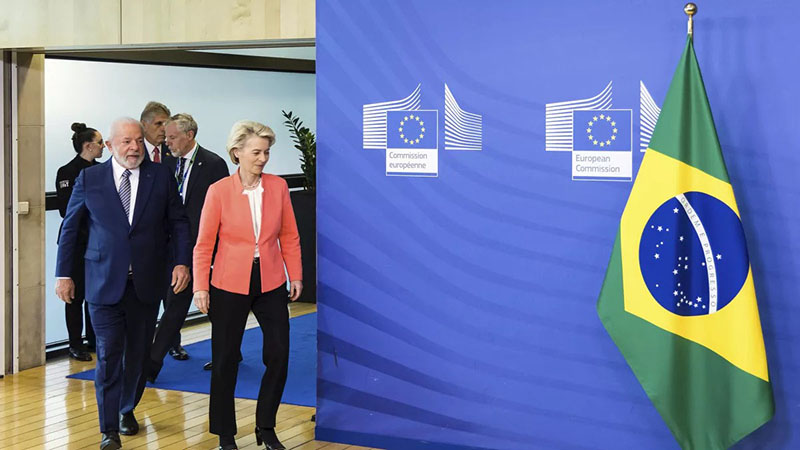
وصل الخلاف بين فرنسا والمفوضية الأوروبية حول اتفاقية التجارة لميركوسور إلى ذروة جديدة ، يتجلى في غياب رئيسة المفوضية أورسولا فون دير لاين عن حفل إعادة افتتاح كاتدرائية نوتردام. كان اسمها مفقودا بشكل ملحوظ من قائمة الضيوف الرسمية ، بسبب "مشكلة في الاتصال" بين بروكسل وباريس. ومع ذلك ، يبدو هذا التفسير مشكوكا فيه وينظر إليه على نطاق واسع على أنه عذر مناسب. ومن المفارقات أن الرئيس الفرنسي إيمانويل ماكرون أيد مؤخرا إعادة تعيين فون دير لاين رئيسا للمفوضية.
وقد زودت هذه الحادثة السيدة فون دير لاين بطعم غير متوقع للتهميش داخل الاتحاد الأوروبي، وهو شعور غالبا ما تشاركه الشركات الصغيرة والمتوسطة في الاتحاد الأوروبي. وكثيرا ما تجد الشركات الصغيرة والمتوسطة نفسها مهملة أو مستبعدة ، مثلما كانت فون دير لاين في هذه الحالة. والجدير بالذكر أن "خطأ الاتصال" هذا لم يؤثر على اجتماعات ماكرون في عطلة نهاية الأسبوع مع الرئيس الأمريكي المنتخب دونالد ترامب والرئيس الأوكراني فولوديمير زيلينسكي، مما يسلط الضوء على الطبيعة الانتقائية لهذه التفاعلات.
ألمانيا تستضيف قمة أخرى للصلب وسط تحديات الصناعة
يوم الاثنين ، تنعقد "قمة فولاذية" ثالثة في المستشارية الألمانية ، لمواصلة سلسلة من المناقشات بقيادة المستشار أولاف شولتس. بعد القمم السابقة في 29 أكتوبر و 15 نوفمبر 2024 ، يركز هذا الاجتماع حصريا على منتجي الصلب والنقابات العمالية ومجالس العمل الألمانية. تهدف الأجندة إلى ترسيخ التدابير لدعم صناعة الصلب المتعثرة ، والتي تم تخصيصها بالفعل أكثر من 7 مليارات يورو في شكل إعانات إضافية هذا العام وحده. وتستثني هذه الأرقام آليات الدعم الموجودة مسبقا، مثل شهادات ثاني أكسيد الكربون المجانية في الاتحاد الأوروبي وتعويض أسعار الكهرباء للصناعات كثيفة الاستهلاك للطاقة، والتي تكلف دافعي الضرائب معا حوالي 1.5 مليار يورو سنويا.
أثار نهج المستشار تساؤلات حول أولوياته ، حيث يقترح المشاركون المدعوون التركيز على استرضاء اللاعبين الرئيسيين في الصناعة وقاعدته السياسية. تعكس هذه الاستراتيجية صدى الانتقادات الموجهة إلى إهمال فون دير لاين الملحوظ للشركات الصغيرة والمتوسطة ، حيث تجد الشركات الصغيرة نفسها مرة أخرى مستبعدة من المناقشات السياسية الهامة. بدلا من معالجة القضايا الأساسية مثل زيادة الطلب المحلي على الصلب ، يبدو أن الحكومة ملتزمة بضخ مليارات اليورو في قطاع يعاني من أوجه القصور الهيكلية.
سياسات مدفوعة بالانتخابات أم دعم حقيقي للصناعة؟
يشير توقيت وهيكل هذه القمم إلى استراتيجية سياسية تهدف إلى تأمين الأصوات بدلا من تنفيذ حلول طويلة الأجل. يجادل النقاد بأن التركيز على أصحاب المصلحة في صناعة الصلب على الشركات الصغيرة والمتوسطة يعكس نمطا أوسع من الإهمال للاعبين الاقتصاديين الأصغر. وفي الوقت نفسه ، يواصل منتجو الصلب المحليون التعامل مع التحديات المتجذرة في السياسات القديمة والمنافسة العالمية.
في حين أن جهود المستشار لدعم صناعة الصلب قد يكون لها صدى لدى بعض الدوائر الانتخابية ، إلا أنها تخاطر بإدامة أوجه القصور دون تعزيز الابتكار أو معالجة المخاوف الاقتصادية الأوسع. وقد توفر هذه الاستراتيجية إغاثة قصيرة الأجل، ولكنها تثير تساؤلات خطيرة حول استدامة هذه السياسات على المدى الطويل.
